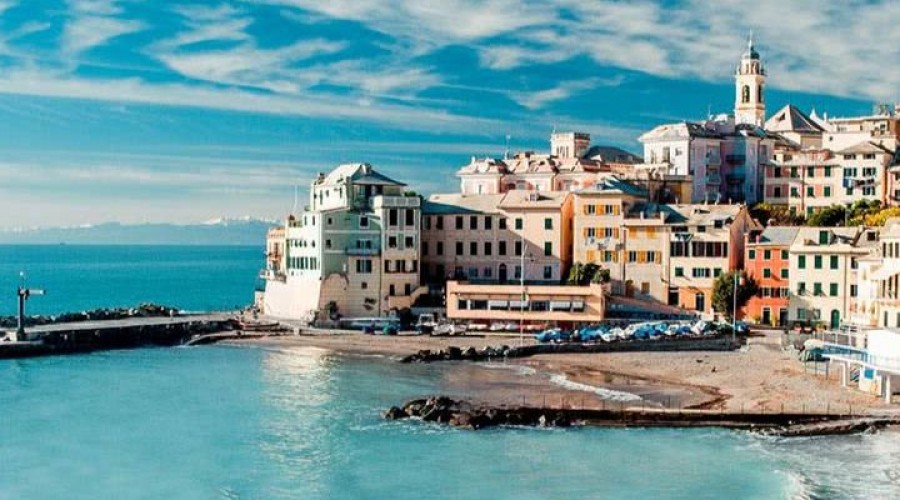The Bristol Palace, a “sounding board” for Uto Ughi and Rostropovich
Destination
Thu, 04/15/2021 - 09:00

A suite with a balcony
In 1991 the Bristol Palace in Genoa hosted two special guests, Uto Ughi and Mstislav Rostropovich, members of the classical music elite and famous the world over. Not only did the two musicians stay at the hotel, they also played at a special gala concert at the Teatro Carlo Felice on December 27. It was the first performance in a travelling world festival, “Old and New Indian Ways”, organized as part of the celebrations for the 500th anniversary of Cristopher Columbus’s voyage to the Americas. Ughi was, of course, the lead violinist whereas Rostropovich, a brilliant cellist in his own right, was the conductor for the occasion. Both featured in an anecdote that has remained in the history of the hotel.
An unforgettable concert
The Bristol Palace was the two musicians’ home from home in Genoa. It was the pre-Christmas period and, maybe without realising it, Ughi and Rostropovich treated everyone – staff and guests – to an unexpected present, when they began to play their instruments non-stop, flooding the hotel’s corridors and reception rooms with music. All of a sudden, it was as if they had transformed their suites into the orchestra pit of the Teatro Carlo Felice.
The concierge of the time recalls that, “It was like being at the theatre: the monumental elliptical staircase, the symbol of our hotel, amplified the sounds and carried them to all six floors. It was possible to hear the music in every room of the Bristol. Both the hotel guests and all my colleagues present and I fell immediately into a religious silence, enchanted as we were by the wonderful notes of Uto Ughi on the violin and Mstislav Rostropovich on the cello: whenever would we have expected to hear something similar?”
But that’s not all: history and music hold more than a surprise in store. Fifteen years later, a special event was held to celebrate New Year’s Eve: 101 cellists from all over the world chose the hotel as one of the venues for a major travelling collective exhibition organized in Genoa. But they didn’t play in a concert hall: they all sat directly on the marble staircase, from top to bottom, transforming it into a pillar of harmony, a unique sounding board.
The event was a poetic way of closing the circle opened on that far-off day in 1991. Surprise, surprise, the inventor of collective concerts was no less than Rostropovich himself. Mindful of the performance he improvised in front of the Berlin Wall in 1989, in 2001 the musician assembled 166 cellists, and subsequently musicians from all over the world imitated his example, meeting and celebrating music with collective events.
The meeting of two musical geniuses
Even people who know nothing of classical music have heard of Uto Ughi. Italy’s most famous Italian violinist, he was born Bruto Diodato Emilio Ughi in 1944. He performed for the first time at the age of seven, when his precocity caused amazement, so much so that by the age of twelve, he was already being described by one critic as “a technically and artistically mature concert performer”. After that his career took off and began touring the world without respite. He has played at all the major festivals with all the major symphonic orchestras, such as that of the Concertgebouw in Amsterdam, the Boston Symphony Orchestra, the Philadelphia Orchestra, the New York Philharmonic and the Washington Symphony Orchestra.
One of the great maestros who conducted him was Mstislav Rostropovich, better known as a cellist, and their paths crossed on various occasions. Rostropovich, who was born in 2007, was the protagonist of an episode that has stayed in the collective imagination when he played on front of the Berlin Wall as it crumbled under the pickaxe blows of the crowd on November 11 1989, the day that marked the end of the Cold War. Born in 1927 in Azerbaijan, then part of the Soviet Union, he received the State Stalin Award, the highest Soviet civil honour, for his artistic achievements when he was only 23. In 1956 he became first cello in the Soviet State Orchestra and began touring abroad. His career took him virtually everywhere, earning him fame as one of the most influential musicians of the second half of the twentieth century.














